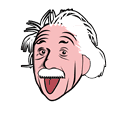"I may be a rotten speller but I'm not stupid!"
Does this apply to you or your students?
English spelling is famous for being difficult - some people think it's amazing that any English children learn to spell accurately. Many people do have particular difficulty because their brains are organised in such a way that the skills needed for spelling do not come automatically. This difficulty is sometimes described as dyslexia.
It's estimated that 10% of the population are dyslexic to some extent - that means over 5 million people in Britain alone. One in 25 is said to be affected badly enough to need specialised help. These days, most schools and colleges do recognise dyslexia, but the extra help provided varies a great deal. Years ago, the situation was much worse: little was known about dyslexia and children who had literacy problems at school were often put in the lowest classes for all subjects. Many left school lacking in confidence and have not reached their full potential.
Most dyslexic people do learn to read, although they may not find this easy. Spelling, however, usually remains a problem - and it has nothing to do with intelligence. Some of the world's greatest achievers have been awful at spelling, for example:

Albert Einstein, scientist, thought of by many to be the
greatest genius who ever lived.
Some other famous dyslexics:
It is no coincidence that many famous dyslexics are great scientists, artists or designers. Dyslexic people often have talents in this area. Some are lucky enough to have the opportunities to develop their talents despite their spelling problems; others have been held back by the mistaken belief that poor spelling means all-round low ability.
If you are affected by dyslexia, don't be embarrassed by poor spelling - boast to people about your other talents! A dyslexic writer and reviewer, Thelma Good always signs herself: "I am dyslexic and therefore a creative speller!"
Spellzone was written by an experienced dyslexia teacher for:
Spellzone follows the principles of multi-sensory teaching: using sound, sight and movement to teach spellings and to fix them in the mind.
Teachers of dyslexics will be interested to know that Spellzone covers an area ignored by many spelling courses: the unstressed vowel or 'schwa' sound, which is the cause of many spelling errors e.g. calender or calendar? importent or important? definate or definite? Spellzone provides the student with strategies for learning words where the sound is not clear.
Spellzone is not a complete literacy program and does not claim to be a complete 'cure-all' for dyslexics, some of whom will need extra help at some stages of the course. However, it will fill many of the gaps in basic spelling knowledge and teachers of dyslexics will find Spellzone useful, either as the basis of a course (the Spellzone 'Spelling Ability Test' provides a baseline 'Spellzone Score' and creates a personal 'Course Pathway' for each student) or as a back-up to their own material.
"Thank goodness for Spellzone during this remote learning phase. The site is easy for students to navigate independently and they're really enjoying the activities and spelling games. You get an awful lot for your money with Spellzone. Really reassuring is the very prompt response with helpdesk queries. I've very rarely needed the helpdesk, but when I have, the issue has been addressed and sorted within a very short time."
Sarah Taggart, Oasis Academy Lord's Hill